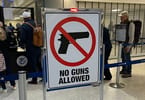- Afghanistan president Ashraf Ghani has left Afghanistan as Taliban closes in on Kabul, according to the country’s top peace negotiator Abdullah Abdullah.
- Al Jazeera TV has been broadcasting exclusive coverage from within the palace showing Taliban FIghters sitting in the presidential office in Kabul
- The US Embassy in Kabul is instructing US cirizens about reports about Kabul Airport was on fire. The advice to Americans stranded in Afghhanistan to take shelter in place
Islamic Emirate of Afghanistan to be announced by Taliban
The Taliban Regime is planning to rename Afghanistan to the Islamic Emirate of Afghanistan.
In the meantime the United States is sending 6000 soldiers directly to Afghanistan, these are an additional 1000 to the already 5000 on the way.
Journalists reporting for the Qatar-based news network Al Jazeera were invited today to tour the Presidential Palace in Kabul, Afghanistan. Taliban Fighters were posing in the presidential office with machine guns.
There seems to be panic and fear, but no bloodshed reported in the Capital CIty of Kabul today with Taliban fighters taking control of the city at record speed.
It started in the morning on Sunday, August 15, and ended at night. Afghanistan is back under the control of the Taliban after 20 years and trillions spend to keep them out.
Late on Sunday, it was announced that Ghani had left the country with several members of his cabinet.
“The former President of Afghanistan has left Afghanistan. He has left the nation in this state [for that] God will hold him to account,” Abdullah Abdullah, chairman of the High Council for National Reconciliation, said in a video posted to his Facebook page.
The collapse of the Western-backed government in Kabul comes in the wake of Taliban blitzkrieg that began on August 6 and led to the capture of more than two dozen Afghan provinces by Sunday morning.
Afghan President Ashraf Ghani has fled Afghanistan for Tajikistan. This is seen as unpatriotic by Afghan citizens.
Frustrated western countries are scrambling to evacuate embassy staff. UK Prime Minister Boris Johnson is urging nations not to recognize the Taliban Government for Afghanistan.

There are approximately 1500 Nepal citizens in Afghanistan. The Nepal Foreign ministry said Nepal is trying to make arrangements to assist its citizens to leave Afghanistan.
France relocated its embassy to the airport region in Kabul, while US reports say the airport was on fire and closed. EU diplomats had been relocated to undisclosed locations.

The US State Department published this interview with US Secretary of State Anthony Blinken with ABC News
Antony J. Blinken, Secretary of State
Washington, DC
QUESTION: And now Secretary of State Tony Blinken. Secretary Blinken, thank you for joining us.
SECRETARY BLINKEN: Thanks for having me.
QUESTION: Let’s start with the status of our embassy in Kabul. Are you confident in the security of American personnel at the embassy even as the Taliban encircle Kabul?
SECRETARY BLINKEN: That is job one for me, John. We are working to make sure that our personnel are safe and secure. We’re relocating the men and women of our embassy to a location at the airport. It’s why the President sent in a number of forces to make sure that, as we continue to draw down our diplomatic presence, we do it in a safe and orderly fashion and at the same time maintain a core diplomatic presence in Kabul.
QUESTION: So let me just make sure I heard you correctly. You’re relocating personnel to the embassy – does that mean you are shuttering the U.S. embassy compound in Kabul, that that building will be abandoned?
SECRETARY BLINKEN: Right now, the plan that we’re putting into effect is to move personnel from the embassy compound in Kabul to a location at the airport to ensure that they can operate safely and securely, also to continue to have people leave Afghanistan as we’ve been doing since April – late April, April 28th. We’ve been on ordered departure ever since then. We’ve done it in a very deliberate way. We’ve adjusted depending on the facts on the ground. It’s why we had forces at hand that the President sent in to make sure that we could do this in a safe and orderly fashion. But the compound itself – our folks are leaving there and moving to the airport.
QUESTION: An internal document that went out to embassy personnel on Friday instructed American personnel at the embassy to reduce the amount of sensitive information on the property, and it also said, “Please…include items with embassy or agency logos, American flags, or items which could be misused in propaganda efforts.” So clearly the concern here is that the Taliban – and this is also, I assume, why you’re relocating people to the airport – that the Taliban would overwhelm and take over that embassy compound.
SECRETARY BLINKEN: This is standard operating procedure in any such situation. There are plans in place if we’re leaving an embassy compound, relocating our people to another place, to take all of those steps, the ones that you just listed. So this is exactly what we would do in any of these situations, and again, this is being done in a very deliberate way, it’s being done in an orderly way, and it’s being done with American forces there to make sure we can do it in a safe way.
QUESTION: Respectfully, not much about what we’re seeing seems too orderly or standard operating procedure. Just last month, President Biden said that under no circumstance – and that was his – those were his words – under no circumstance were U.S. personnel, embassy personnel be airlifted out of Kabul in a replay of the scenes that we saw in Saigon in 1975. So isn’t that exactly what we’re seeing now? I mean, even the images are evocative of what happened in Vietnam.
SECRETARY BLINKEN: Let’s take a step back. This is manifestly not Saigon. The fact of the matter is this: We went to Afghanistan 20 years ago with one mission in mind, and that was to deal the people who attacked us on 9/11. And that mission has been successful. We brought bin Laden to justice a decade ago; al-Qaida, the group that attacked us, has been vastly diminished. Its capacity to attack us again from Afghanistan has been – right now does not exist, and we’re going to make sure that we keep in place in the region the capacity, the forces necessary to see any re-emergence of a terrorist threat and to be able to deal with it. So in terms of what we set out to do in Afghanistan, we’ve done it.
And now, all along, the President had a hard decision to make, and that decision was what to do with the remaining forces that we inherited when we came to office that were in Afghanistan, with a deadline established by the previous administration to get them out by May 1st. That’s the decision he made. We’ve been in Afghanistan for 20 years – $1 trillion, 2,300 American lives lost – and again, thankfully, having succeeded in doing what we set out to do in the first place. The President made the determination that it was time to end this war for the United States, to get out of the middle of a civil war in Afghanistan, and to make sure that we were looking at our interests across the world, around the world, and that we were set up to advance those interests. That’s what we’re doing.
QUESTION: But the President was also advised by his top military advisors, as I understand, to leave some military presence in the country of about 3-4,000 U.S. troops. Is there any regret now that he didn’t take that advice, the advice of his top military advisors, to leave some military presence in Afghanistan?
SECRETARY BLINKEN: Here’s the choice the President faced. Again, remember that a deadline was established by the previous administration of May 1st to get our remaining forces out of Afghanistan. And the idea that we could have sustained the status quo by keeping our forces there I think is wrong, because here’s what would have happened if the President decided to keep those forces there: During the period from when the agreement was reached to May 1st, the Taliban had ceased attacking our forces, ceased attacking NATO forces. It had also held off on this major offensive that we see now to try to take over the country, to go for these provincial capitals, which in recent weeks it has succeeded in doing.
Come May 2nd, if the President decided to stay, all gloves would have been off. We would have been back at war with the Taliban. They would have been attacking our forces. We would have had 2,500 or so forces remaining in the country with air power. I don’t think that would have been sufficient to deal with what we’re seeing, which is an offensive across the entire country, and I would be on this program in that instance probably having to explain why we were sending tens of thousands of forces back into Afghanistan to continue a war that the country believes needs to end after 20 years, $1 trillion, and 2,300 lives lost, and success in achieving the goals that we set when we went in in the first place.
QUESTION: Let me play you something that President Biden said earlier this year when he was asked about the prospects of what, basically, we’re seeing right now, a Taliban takeover of Afghanistan:
“The likelihood there’s going to be the Taliban overrunning everything and owning the whole country is highly unlikely.”
So was he misled by his own intelligence agencies? Did he not listen to them? Why was he so wrong about that?
SECRETARY BLINKEN: Two things. He said and we’ve said all along that the Taliban was in a position of strength. When we came to office, the Taliban was at its strongest position at any time since 2001, since it was last in power in Afghanistan before 9/11, and it’s been able to build up its capacity over the last couple of years in a very significant way. So that was something we saw and foresaw.
Having said that, the Afghan Security Forces – Afghan Security Forces that we’ve invested in, the international community has invested in for 20 years – building up a force of 300,000, equipping them, standing by an air force that they had that the Taliban did not have – that force proved incapable of defending the country. And that did happen more rapidly than we anticipated.
QUESTION: So what does this all mean for America’s image in the world and for what President Biden has spoken so forcefully about, the need to fight on behalf of democracy and democratic values, to see us leaving and an extremist group coming in and taking power that wants to close down the right of girls to go to school, that is executing surrendering soldiers, that is anything but representative of those democratic values that President Biden said that the United States must stand for?
SECRETARY BLINKEN: So I think there are two things that are important here. First, I come back to this proposition that in terms of what we set out to do in Afghanistan – the reason we were there in the first place, to deal with those who attacked us on 9/11 – we succeeded in doing that. And that message I think should ring out very strongly.
It’s also true that there’s nothing that our strategic competitors around the world would like more than to see us bogged down in Afghanistan for another five, ten, or twenty years. That is not in the national interest.
The other thing is this: When we consider women and girls, all those who’ve had their lives advanced, this is searing. It is hard stuff. I’ve met with a number of these woman leaders who’ve done so much for their country and women and girls in Afghanistan over the last 20 years, including as recently as April when I was in Kabul. And I think it is now incumbent on the international community to do everything we can using every tool we have – economic, diplomatic, political – to try to sustain the gains that they’ve made.
And ultimately it is in the Taliban’s self-interest – they have to make that determination, but it’s in their self-interest if they truly seek acceptance, international recognition; if they want support, if they want sanctions lifted – all of that will require them to uphold basic rights, fundamental rights. If they don’t and if they’re in a position of power and they don’t do that, then I think Afghanistan will become a pariah state.
QUESTION: Secretary of State Tony Blinken, thank you very much for joining us this morning.
SECRETARY BLINKEN: Thanks for having me.
ŠTA UZIMATI IZ OVOG ČLANKA:
- It's why the President sent in a number of forces to make sure that, as we continue to draw down our diplomatic presence, we do it in a safe and orderly fashion and at the same time maintain a core diplomatic presence in Kabul.
- Right now, the plan that we're putting into effect is to move personnel from the embassy compound in Kabul to a location at the airport to ensure that they can operate safely and securely, also to continue to have people leave Afghanistan as we've been doing since April – late April, April 28th.
- The collapse of the Western-backed government in Kabul comes in the wake of Taliban blitzkrieg that began on August 6 and led to the capture of more than two dozen Afghan provinces by Sunday morning.























